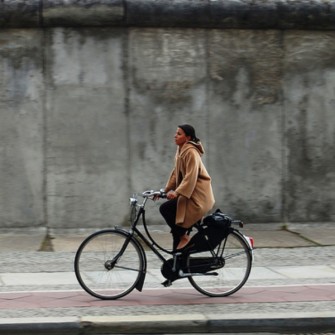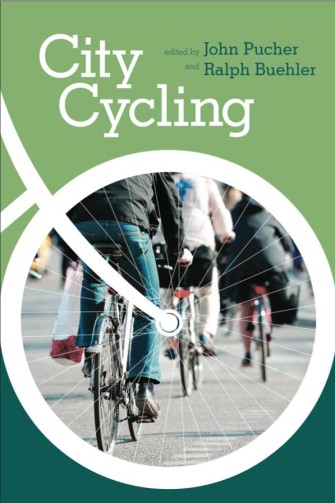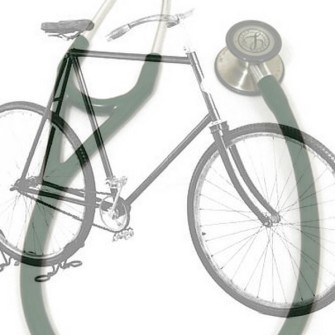
Cycle For One Hour and You’ll Live an Hour Longer-"City Cycling" Talk with John Pucher
Professor John Pucher is nothing short of a cycling guru. He’s a passionate academic and provides bicycle advocates with the ammunition--the facts and figures--to give to decision makers. His new book, “City Cycling,” co-authored with Ralph Buehler, is set to be published in September. It may well turn out to be the “Bible” of bicycle policy. ECF had a chat to him about his work.
We all know that cycling is good for your health. The question that we should instead be asking is “how healthy is cycling?”
About "City Cycling"
Chapters 3 and 7 of the MIT Press book “City Cycling” provide detailed analysis of the issues of health benefits and cycling safety, with a comprehensive listing of all scientific studies on these topics. The overall message of thesechapters is that cycling is very healthy. “City Cycling”appears in print in September but can already be ordered at a pre-publication discount ($18) at Amazon and Barnes and Noble.
According to the upcoming MIT Press book, “City Cycling,” the scientific evidence is “overwhelming.” One study cited in the book even says that an hour of moderate to vigorous cycling extends an individual’s expected healthy lifetime by more than an hour.
“We’ve provided a comprehensive review of the many studies documenting the physical, mental, and social health benefits of cycling for daily travel,” explains Professor John Pucher, co-author and editor of City Cycling.
“And reduced health costs from increased cycling far exceed the costs of cycling infrastructure,” he adds.
It’s too dangerous not to cycle
Politicians often say that while they’d love to promote cycling, it’s simply too dangerous. Well this new book published by MIT Press turns the danger myth on its head.
“All scientific studies find that, even using conservative, understated estimates of the health benefits of cycling, they far exceed any traffic risk,” explains Pucher.
The exact ratio varies from city to city and from country to country, but the health benefits of cycling are at least five times higher than the traffic risks, and in some countries, such as the Netherlands and Denmark, the ratio is almost twenty-to-one.

"Cycling in London Traffic"-Although cycling in traffic may appear dangerous, the benefits far outweigh the risks
So what’s the best way to improve safety?
“Motor vehicles impose the most serious traffic dangers to cyclists,” explains Pucher.
“You’ve got to reduce motor vehicles speeds on shared roadways and provide physical separation of cyclists from motor vehicle traffic on arterials. You also have to restrict car use by implementing car-free zones, traffic-calmed residential neighborhoods, and lowering car speeds on city streets. This is crucial to increasing both cyclist and pedestrian safety.”
The Helmet Question
“Although much of the focus of cycling safety has been on bike helmets, laws requiring helmet use are not an effective strategy,” Pucher tells us.
All evidence cited in “City Cycling” shows that helmet laws discourage cycling so much that the reduced health benefits from less cycling are much greater than any alleged safety benefits of helmet laws. But above all, the book is suggesting it’s time to push the helmet debate to one side and focus on the real dangers affecting cyclists.
“In short, the focus on cycling safety should be on restricting car use and improving motorist behaviour,” says Pucher.

According to "City Cycling", Helmets should be a matter of individual choice
ECF can’t wait to get their hands on this new book. While it’s no surprise that cycling is good for your health, the sheer volume of scientific evidence of the health benefits of cycling, both for individuals and for society as a whole, provides a strong incentive for far greater public and political support for pro-cycling policies.
"City Cycling" leaves the reader with no choice but to act.
This is article is part of a series on the upcoming book "City Cycling". As new articles in the series appear online, click on the image below to view them.
 |
 |
|
| Health and Cycling
"Cycle For One Hour and You'll Live an Hour Longer" |
It’s All About ‘High Heels on Wheels’
|
Children Are The Future of Cycling |
 About the Author
About the Author
John Pucher is a professor in the School of Planning and Public Policy at Rutgers University in New Jersey. He has conducted research on a wide range of topics in transport economics and finance, including numerous projects for the U.S. Department of Transportation, the Canadian government, and various European ministries of transport. For over three decades, he has examined differences in travel behavior, transport systems, and transport policies in Europe, Canada, the USA, and Australia. Over the past 15 years, Pucher's research has focused on walking and bicycling, and what North American and Australian cities can learn from European cities to improve the safety, convenience, and feasibility of these non-motorized modes.
Contact the author
Recent news!
Upcoming events
Contact Us
Avenue des Arts, 7-8
Postal address: Rue de la Charité, 22
1210 Brussels, Belgium












